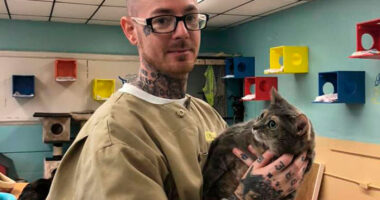Michaela Sparrow has struggled with her weight for most of her life.
When she was younger she never understood why others seemed to shed kilos easily, while for her it was near impossible.
‘To most people I probably didn’t look “overweight”, but I always found it incredibly hard to lose weight and even harder to keep it off,’ the now 38-year-old naturopath from Newcastle, New South Wales told Daily Mail.
Throughout her twenties, Michaela tried to slim down. The rate of loss was always maddeningly slow and all it took was a small slip-up for her to put the weight back on – sometimes with added interest.
‘I thought I was healthy but have always had a big appetite. Even as a child, I was eating an adult-sized meal,’ she said.
‘I was stuck in yo-yo dieting and was “skinny fat”, I had skinny legs with love handles.’
Michaela’s battle with weight gain, insatiable hunger, and stubborn belly fat seemed unwinnable – until she began studying naturopathic medicine in 2014.
The more she learned about the physiology of the body, the more things began to click.
Then, when she learned about ‘insulin resistance’, the final piece of the puzzle fell into place.

‘To most people I probably didn’t look “overweight”, but I always found it incredibly hard to lose weight and even harder to keep it off,’ Michaela Sparrow (pictured) told the Daily Mail

After losing 12kg and keeping it off for five years, Michaela (pictured) went through a period of depression that saw her regain 20kg
Insulin resistance is a condition where the body’s cells become less responsive to insulin, a hormone that helps move glucose from the blood into cells for energy.
When cells resist insulin, blood sugar levels rise and the body produces even more insulin to compensate. High insulin levels can promote fat storage, especially around the abdomen, and make it harder to lose or maintain a healthy weight.
Michaela says upon discovering this, she believed she ‘ticked all the boxes’ of having the condition.
‘If I hadn’t eaten within a couple of hours, I would become so hangry, I would feel dizzy, sick and nauseous. I would get so beside myself my husband would rush to get me something to eat,’ Michaela said.
In addition to this, she also experienced awful brain fog, low energy levels and she would struggle to sleep.
‘I was learning about the role insulin resistance plays in hormonal balance and mental health and all these things,’ Michaela recalled.
Feeling that it all made sense, Michaela went to her GP for a blood test, which confirmed her insulin levels were extremely high.
‘I realised that insulin resistance was the main issue driving my weight problems, particularly my difficulty maintaining weight loss,’ she said.
Through research, Michaela learned how diet can impact insulin sensitivity.
‘Even though I was eating what most people would consider a very healthy diet, it was too high in carbohydrates for my metabolic type,’ she said.
Shortly after her diagnosis, she tried a modified ketogenic diet for the first time and managed to drop a few kilos more easily than she ever had.
To achieve this, she consumed a low amount of carbs, cutting out pasta, grains, legumes, and starchy carbs like potatoes and sweet potatoes.
She also upped her protein intake, focusing on eggs, meat and cheese, and lots of vegetables – but excluded higher-sugar veggies like corn and peas.
When she started this way of eating, she weighed 70kg and within a year, had lost 12kg, reaching a happier weight of 58kg.
‘I got that weight off and maintained it for a good five years as long as I followed an eating pattern suited to my metabolism 80 per cent of the time,’ Michaela said.
‘If I drifted from that way of eating too far, I would gain weight very easily.’
However, Michaela hit a bump in the road after the death of her beloved family dog and a bout of depression that followed.
‘I went through an extremely stressful and traumatic period that involved deep grief and loss. During that time, I completely stopped caring about my health. I was drinking heavily, drinking six beers a day, even though I’m not a big drinker, and ate a lot of unhealthy comfort food,’ Michaela said.
For three months, Michaela struggled with depressive thoughts.
‘I was spiralling and gained around 14kg in just a few months. When I came out of that period and started to feel like myself again, I was mortified by what I had done and who I had become.’
While her job as a naturopath meant she spends the day helping other women achieve their health goals, she felt unable to help herself.
‘I was back to insulin-resistant levels. It was so frustrating and confusing as to how easy it was for me to end up this way again.’
The turning point came after two things happened: she attended her girlfriend’s 40th birthday in Sydney, and a rescue bulldog became available for adoption.

Genetic testing revealed Michaela had ‘fat genes’ – but she used the knowledge to empower her and get the extra kilos off for good

Now that Michaela understands how her body works, she eats a high protein, low carb diet, which helps keep her weight down
‘It was like an epiphany. I woke up and said to myself, “I need to live. I don’t want to feel this way anymore. I need to sort it out. I know exactly what I need to do.”‘
Discovering she was insulin resistant had once helped Michaela take control of her diet and weight. Now, she wondered if understanding even more about her body could help her tackle weight gain again.
Michaela decided to put the genetic tests she regularly ran for clients to use on her own health.
The test was a simple cheek swab, which set her back $650 – but the results would be life-changing.
When she received the results, Michaela learned she had many ‘crappy genes’ that increased her risk for weight gain and chronic diseases, and very few protective genes.
These ‘fat genes’ included variants in FTO, ADRB2, FABP2, PPARG, and ADIPOQ, which influence how the body stores fat, regulates insulin and glucose, and responds to exercise and diet.
‘When I got the test back, I was quite upset, frustrated and angry. I was like, “I have so many crappy genes”,’ she said.
‘After I got over that initial anger, I understood how my body works. It made me understand my hormone issues, why I’m so hungry all the time, why I crave salt, why it’s so easy for me to gain weight and why it’s harder to lose.
‘Then I felt really empowered to make a change for me and accepted this is how I am.’
By continuing to follow a higher protein, lower carb diet, focusing on exercise and sleep, and managing stress, Michaela was able to lose 20kg.
She learned that by using a process called epigenetics you can ‘turn on’ beneficial genes and ‘turn off’ those that increase disease risk.
‘We have a huge percentage control over our genes. There’s only a small percentage that we have no control over,’ Michaela said.
‘You can turn on bad genes through poor diet, trauma, inflammation, whereas you can turn on good genes with good habits.’
Michaela’s perspective is that understanding epigenetics is empowering, not frightening, because it means you have significant influence over your health through your choices.
‘It’s ironic I’m really passionate about anti-aging, longevity, health span and medicine and a lot of the genes that I have increased my risk of a lot of chronic diseases that reduce our health span,’ she said.
‘I say to clients all the time you can’t just go on a diet, eat healthy, and then go back to your old ways. You have to find a way to maintain healthy habits for the rest of your life.’









